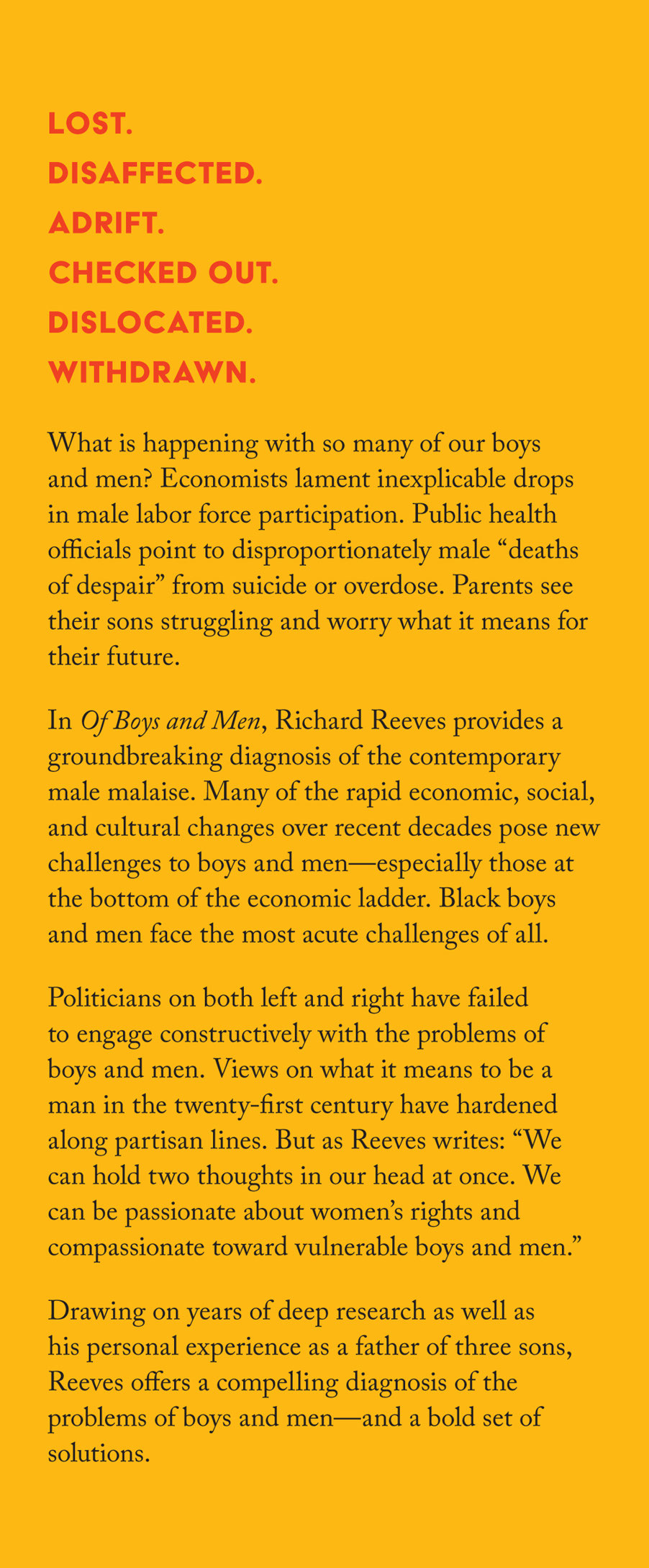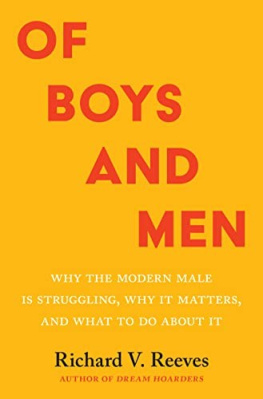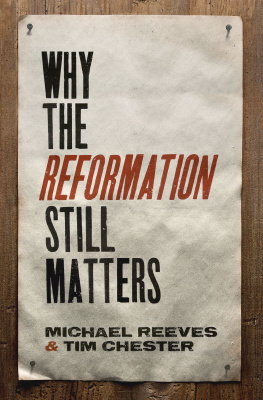Richard V. Reeves - Of Boys and Men: Why the Modern Male Is Struggling, Why It Matters, and What to Do About It
Here you can read online Richard V. Reeves - Of Boys and Men: Why the Modern Male Is Struggling, Why It Matters, and What to Do About It full text of the book (entire story) in english for free. Download pdf and epub, get meaning, cover and reviews about this ebook. year: 2022, publisher: Brookings Institution Press, genre: Politics. Description of the work, (preface) as well as reviews are available. Best literature library LitArk.com created for fans of good reading and offers a wide selection of genres:
Romance novel
Science fiction
Adventure
Detective
Science
History
Home and family
Prose
Art
Politics
Computer
Non-fiction
Religion
Business
Children
Humor
Choose a favorite category and find really read worthwhile books. Enjoy immersion in the world of imagination, feel the emotions of the characters or learn something new for yourself, make an fascinating discovery.
- Book:Of Boys and Men: Why the Modern Male Is Struggling, Why It Matters, and What to Do About It
- Author:
- Publisher:Brookings Institution Press
- Genre:
- Year:2022
- Rating:4 / 5
- Favourites:Add to favourites
- Your mark:
- 80
- 1
- 2
- 3
- 4
- 5
Of Boys and Men: Why the Modern Male Is Struggling, Why It Matters, and What to Do About It: summary, description and annotation
We offer to read an annotation, description, summary or preface (depends on what the author of the book "Of Boys and Men: Why the Modern Male Is Struggling, Why It Matters, and What to Do About It" wrote himself). If you haven't found the necessary information about the book — write in the comments, we will try to find it.
Richard V. Reeves: author's other books
Who wrote Of Boys and Men: Why the Modern Male Is Struggling, Why It Matters, and What to Do About It? Find out the surname, the name of the author of the book and a list of all author's works by series.
Of Boys and Men: Why the Modern Male Is Struggling, Why It Matters, and What to Do About It — read online for free the complete book (whole text) full work
Below is the text of the book, divided by pages. System saving the place of the last page read, allows you to conveniently read the book "Of Boys and Men: Why the Modern Male Is Struggling, Why It Matters, and What to Do About It" online for free, without having to search again every time where you left off. Put a bookmark, and you can go to the page where you finished reading at any time.
Font size:
Interval:
Bookmark:

Why the Modern Male Is Struggling, Why It Matters, and What to Do about It
RICHARD V. REEVES
BROOKINGS INSTITUTION PRESS
Washington, D.C.
Copyright 2022
THE BROOKINGS INSTITUTION
1775 Massachusetts Avenue, N.W.
Washington, D.C. 20036
www.brookings.edu
All rights reserved. No part of this publication may be reproduced or transmitted in any form or by any means without permission in writing from the Brookings Institution Press.
The Brookings Institution is a private nonprofit organization devoted to research, education, and publication on important issues of domestic and foreign policy. Its principal purpose is to bring the highest quality independent research and analysis to bear on current and emerging policy problems. Interpretations or conclusions in Brookings publications should be understood to be solely those of the authors.
Library of Congress Control Number: 2022938978
ISBN: 978-0-815-73987-6 (hardcover)
ISBN: 978-0-815-73988-3 (ebook)
9 8 7 6 5 4 3 2 1
Typeset in Janson Text LT Std
Composition by Westchester Publishing Services
For George, Bryce, and Cameron
I have been worrying about boys and men for 25 years. That comes with the territory when you raise three boys, all now grown men. George, Bryce, Cameron: I love you beyond measure. Thats why, even now, I sometimes worry about you. But my anxiety has spilled over into my day job. I work as a scholar at the Brookings Institution, focusing mostly on equality of opportunity, or the lack thereof. Until now, I have paid most attention to the divisions of social class and race. But I am increasingly worried about gender gaps, and perhaps not in the way you might expect. It has become clear to me that there are growing numbers of boys and men who are struggling in school, at work, and in the family. I used to fret about three boys and young men. Now I am worried about millions.
Even so, I have been reluctant to write this book. I have lost count of the number of people who advised against it. In the current political climate, highlighting the problems of boys and men is seen as a perilous undertaking. One friend, a newspaper columnist, said, I never go near these issues if I can avoid it. Theres nothing but pain there. Some argue that it is a distraction from the challenges still faced by girls and women. I think this is a false choice. As an advocate for gender equality, I think a lot about how to close the pay gap between women and men. (For every $100 earned by men, women earn $82.) As you will see, I think the solutions here include a more equal allocation of childcare, helped by generous paid leave for both mothers and fathers. But I am just as worried about the college degree attainment gap in the other direction, which is just one symptom of a large and growing gender gap in education. (For every 100 bachelors degrees awarded to women, 74 are awarded to men.) Here I propose a simple but radical reform: start boys in school a year later than girls.
In other words, redesign jobs to be fairer to women, and reform schools to be fairer to boys.
We can hold two thoughts in our head at once. We can be passionate about womens rights and compassionate toward vulnerable boys and men.
I am of course hardly the first to write about boys and men. I follow in the footsteps of Hanna Rosin (The End of Men), Andrew Yarrow (Man Out), Kay Hymowitz (Manning Up), Philip Zimbardo and Nikita Coulombe (Man, Interrupted), and Warren Farrell and John Gray (The Boy Crisis), among many others. So why this book, and why now? I wish I could say that there was a single, simple motivation. But there are six main reasons.
First, things are worse than I thought. I knew some of the headlines about boys struggling at school and on campus, men losing ground in the labor market, and fathers losing touch with their children. I thought that perhaps some of these were exaggerated. But the closer I looked, the bleaker the picture became. The gender gap in college degrees awarded is wider today than it was in the early 1970s, but in the opposite direction. The wages of most men are lower today than they were in 1979, while womens wages have risen across the board. One in five fathers are not living with their children. Men account for almost three out of four deaths of despair, either from a suicide or an overdose.
Second, the boys and men struggling most are those at the sharp end of other inequalities, especially of class and race. The boys and men I am most worried about are the ones lower down the economic and social ladder. Most men are not part of the elite, and even fewer boys are destined to take their place. In 1979, the weekly earnings of the typical American man who completed his education with a high school diploma, was, in todays dollars, $1,017. Today it is 14% lower, at $881. As The Economist magazine puts it: The fact that the highest rungs have male feet all over them is scant comfort for the men at the bottom. Men at the top are still flourishing, but men in general are not. Especially if they are Black: To be male, poor, and African-American is to confront, on a daily basis, a deeply held racism that exists in every social institution, writes my colleague Camille Busette. No other demographic group has fared as badly, so persistently and for so long. Black men face not only institutional racism but gendered racism, including discrimination in the labor market and criminal justice system.
Third, it became clear to me that the problems of boys and men are structural in nature, rather than individual; but are rarely treated as such. The problem with men is typically framed as a problem of men. It is men who must be fixed, one man or boy at a time. This individualist approach is wrong. Boys are falling behind at school and college because the educational system is structured in ways that put them at a disadvantage. Men are struggling in the labor market because of an economic shift away from traditionally male jobs. And fathers are dislocated because the cultural role of family provider has been hollowed out. The male malaise is not the result of a mass psychological breakdown, but of deep structural challenges.
The more I consider what men have losta useful role in public life, a way of earning a decent and reliable living, appreciation in the home, respectful treatment in the culture, writes feminist author Susan Faludi in her 1999 book Stiffed, the more it seems that men of the late twentieth century are falling into a status oddly similar to that of women at mid century.
Fourth, I was shocked to discover that many social policy interventions, including some of the most touted, dont help boys and men. The one that first caught my eye was a free college program in Kalamazoo, Michigan. According to the evaluation team, women experience very large gains, in terms of college completion (increasing by almost 50%), while men seem to experience zero benefit. This is an astonishing finding. Making college completely free had no impact on men. But it turns out that there are dozens of programs that benefit girls and women, but not boys and men: a student mentoring scheme in Fort Worth, Texas; a school choice program in Charlotte, North Carolina; an income boost to low-wage earners in New York City, and many more. The striking failure of these interventions to help boys or men is often obscured by a positive average result, driven by the positive impact on girls or women. In isolation, this gender gap might be seen as a quirk of a specific initiative. But it is a repeated pattern. So not only are many boys and men struggling, they are less likely to be helped by policy interventions.
Font size:
Interval:
Bookmark:
Similar books «Of Boys and Men: Why the Modern Male Is Struggling, Why It Matters, and What to Do About It»
Look at similar books to Of Boys and Men: Why the Modern Male Is Struggling, Why It Matters, and What to Do About It. We have selected literature similar in name and meaning in the hope of providing readers with more options to find new, interesting, not yet read works.
Discussion, reviews of the book Of Boys and Men: Why the Modern Male Is Struggling, Why It Matters, and What to Do About It and just readers' own opinions. Leave your comments, write what you think about the work, its meaning or the main characters. Specify what exactly you liked and what you didn't like, and why you think so.










![Richard Reeves [Richard Reeves and John Knell] - 80 Minute MBA](/uploads/posts/book/127988/thumbs/richard-reeves-richard-reeves-and-john-knell-80.jpg)

